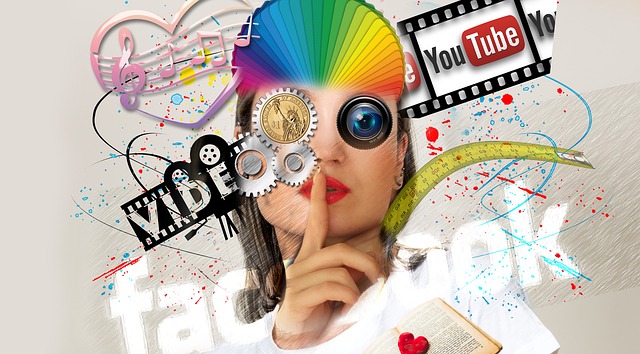clear

source:
geralt / Pixabay
I think social media is definitely causing younger people to think more about how they look because they are constantly flicking through photographs of other people, and altered photographs. Apps like Instagram encourage the use of filters on photographs which alter the way an individual looks. Therefore when someone flicks through a Facebook timeline or instagram home page, they see photographs of both strangers and friends with a perfected look. This is dangerous for the younger generation. With young people being surrounded by images of real faces but faces which are altered to look like a perfected version of themselves, they grow up with a view that this perfect look is obtainable. When growing up, young people are vulnerable to peer pressure, with an overwhelming desire to fit in. Therefore surely when they see nothing but perfection, they feel a pressure to gain this fake perfection look - to do what they can to fit in.
 3
3
clear
Research has consistently shown that exposure to ideal female images negatively influences women's self-evaluations. However, minimal research has examined the effects of media-portrayed male images on young male's self-evaluations. It was hypothesized that compared to men who viewed neutral images, men who viewed ideal physical images of other men or images depicting status and wealth would report lower levels of body esteem and self-esteem .Actually today the struggles are tenfold, as not only do you have to look good and be interesting, but you have to be good at things and appear successful and you have to also seem to have an interesting life. And there are more and more watchers, and more and more brands and advertisers, in the mix. All this, put together, can make a cocktail for reduced self-esteem and feelings of low self-worth, in even the most popular social media users. If you can relate to these ways social media affects our self-worth, it might be time to unplug a little every once in awhile.
 0
0
clear
 Wafa Benizid
6 years, 11 months ago
Wafa Benizid
6 years, 11 months ago
Social media is definitely having an adverse effect on how the youth perceive themselves. With sites such as Facebook or Instagram, engagement will be a regular aspect of their daily lives. Young people are connecting constantly and with every Facebook post the user will be acutely aware that the image they present to the outside world will be scrutinized all the time, and not necessarily solely within their own friendship group.
Every hand-held device or laptop now comes with an in-built camera that is deliberately focussed on the current generation's obsession with self-promotion - the cult of the selfie. This can be seen where photographic subjects are no longer photographed in isolation. The photographer often has to be an instrinsic part of the image. With this change in emphasis comes the natural desire to be seen as photogenic.
Photographs can now be altered to such an extent that youths are being encouraged to airbrush themselves to conform to stereotypes perpetuated in other media, such as magazines where the photographs of catwalk models are unnaturally slim. Young people are particularly prone to the insidiuous side of social media - the trolls and online bullies who home in on the slightest hint of nonconformity and ridicule their targets for daring to embrace ... whatever is regarded with suspicion, from clothes to hairstyles to political opinions to sexuality to body shapes (the list is endless.)
Unfortunately there has always been a tendency to judge a book by its cover and in the internet age that superficiality has put undue pressure on youngsters to alter their appearance appropriately.
 0
0
clear
I think it's more than just the young. Snapchat filters and the use of lighting and angles can allow anyone to present a perfected and curated version of themselves to the word. But for the young there is also a reative and fun side to this. being able to try different looks, play with make up, pick up and put down different styles, can be quite liberating.
However, age comes to us all. And alongside this the algorithms of online advertising target those who are entering different stages of aging with adverts for ways to avoid baldness, prevent wrinkles, whiten teeth and so on and so on.
Previous generations have faced unrealistic body images foist on them by magazines, TV, movies and so on. However, this is the first generation who get to mediate their own body image, possibly making the message stronger. If young people portray themselves in selfies just the way they feel they should look based on magazines, this only intensifies the message of body image from the mainstream media. However this self mediation also allows young people to hack into what is seen as appropriate, creating different standards of beauty and seeing if their friends andd followers on social media pic up the cues and follow them, or adapt their ideas, to face up against the traditional images of how we should look thrown at us by the mainstream media.
There has long been a desire form advertsing to give us insecurities to create opportunities to sell us product. The phrase 'body odour' is not medical in origin but comes from advertising, an attempt to embarrass people into fearing that they mght smell unpleasant so that they buy an advertiser's product. With modern media we have the opportunity as creators and mediators of our own image to intensify such images, or to fight against them.
 0
0
clear
 Andrew Tildesley
6 years, 11 months ago
Andrew Tildesley
6 years, 11 months ago
Yes, in that the filters offered for social media users give them a certain apperanace - an airbrushed, cartoon-like appearance with large eyes and flawless skin. What's strange is that now make-up is appearing that promises that you will look like you have a filter on in real life - so in a way it has come full circle. Because people so constantly see these filtered images, not only of models and celebrities but of their friends, it seems that everybody looks good. So more young people are opting for facial enhancement like lip plumpers and semi permanent tattooed makeup. However, the phenomenon of being influenced by the media, if not social media, is an old one - people have often wished for a nose job to look just like a film star, and movie magazines as far back as the 1920s carried adverts where stars promised "ordinary" people they too could look just like a star if they wore such and such makeup brand.
 0
0
clear
Yes, social media has tremendous aspect in how youth decide for him/herself. They join social media an such early age when they haven't got a sense of self identity and integrity. They are looking for identity by looking at other people pictures and their lives as displayed in them. And it is hard. When you don't have self respect for yourself and bombarded everyday with what's good, what's best, what's need to be fixed, what you should makeover, you will end up thirsty for other's approval about yourself. It is not about what you are, but about what they think about you. Appearance becomes more and more substantial in a youth's life. Nowadays, elementary students have smartphones, and with great specs too. When their parents give them an old cell phone, they will pout and said "it can't do anything". It is depressing up to a story in Taiwan where a girl sold her virginity to buy the newest smartphones.
 0
0
clear
Social media is one of the most inffluential factors which form the public opinion and the appearance of youngsters is not excluded. It requires the a perfect image of everyone without paying attention to personality. Especially for younger people who have not formed their point of view yet, it is quite understandable that teenagers are ready to do everything to get few more likes.
 0
0
clear
This is definitely one of the downsides of social media despite its numerous advantages. Social media acts as a platform where not only people can engage socially but also as a medium to showcase how ‘well’ one is doing. This showcasing is turning out to be very bad for the young people. Take for example a millennial couple that goes to a fancy date in a fancy restaurant and they post pictures of their view, meals and locale. Another millennial that is not doing too well and sees those pictures will want to emulate living that life, yet circumstances are never the same. They read too much from pictures or status updates. That scenario can be replayed a thousand times with cars, a flashy lifestyle, bleaching, implants e.t.c replacing the fancy pictures from a date. Fortunately for the younger generation, social media has evolved from just 'messaging' online to being used for digital marketing and pushing for change. This has given the youth other ways of using social media, even making money from it in the process. While the majority of the youth are still subject to feeling the pressure that comes with social media, some have taken the mantle to change the way social media is used. Not as a platform to just showcase your 'perfect' life but as medium with so much potential.
 0
0
clear
 Alvine Spencer
5 years, 7 months ago
Alvine Spencer
5 years, 7 months ago

Sign up to post or vote on answers.
Improveo will help systemize your knowledge.
